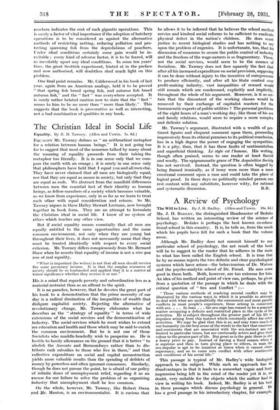The Christian Ideal in Social Life
Equality. By R. H. Tawney. (Allen and Unwin. 7s. 6d.)
EQUALITY Mr. Tawney defines as "an arithmetical metaphor for a relation between human beings." It is not going too far to suggest that most of the nonsense talked by many about the meaning of equality proceeds from their taking the metaphor too literally. It is in one sense only that we com- pare the earth with an orange ; it is surely in one sense only that philosophers have held that I equal you and all men else. They have never claimed that all men are biologically equal, nor that they are equal as means in society, but only that they are equal as ends. We abstract from the manifold differences between men the essential fact of their identity as human beings, as fellow-members of a society which becomes valuable, as we know from experience, only in so far as we learn to treat each other with equal consideration and esteem. So Mr. Tawney argues in these Halley Stewart Lectures, now brought together in book form. They are an attempt to formulate the Christian ideal in social life. I know of no system of ethics which teaches any other view.
But if social equality means essentially that all men are equally entitled to the same opportunities and the sarrie common environment, not only when they are young but throughout their lives, it does not necessarily mean that they must be treated identically with respect to every social criterion. Mr. Tawney differs conspicuously from Mr. Bernard Shaw when he asserts that equality of income is not a sine qua non of real equality.
"What is important (he writes) is not that all men should receive the same pecuniary income. It is that the surplus resources of society should be so husbanded and applied that it is a matter aof minor significance whether they receive it or not."
His is a mind that regards poverty and subordination less as a material restraint than as an affront to the spirit.
It is no paradox, however, that he devotes the great part of his book to a demonstration that the prime necessity of our day is a radical diminution of the inequalities of wealth that disfigure capitalist society. Rejecting the alternative of revolutionary change, Mr. Tawney elaborates what he describes as the "strategy of equality" in terms of wide extensions of the social services and the democratization of industry. The social services which he most wishes to extend
are education and health and those which may be said to enrich the common environment. But he is not one of those Socialists who muddle-headedly wish to pauperize us. He is hostile to family allowances on the ground that it is better" to abolish the Ancoats and Bermondseys rather than to dis- tribute cash subsidies to those who live in them," and that 'collective expenditure on social and capital reconstruction yields more valuable results than the spending of driblets of money by powerless and often ignorant consumers. Similarly,' though he does not pursue the point, he is afraid of our policy of infinite doses of unemployment relief, regarding it as an -excuse for our failure to solve the problem of so organizing industry that unemployment shall be less common.
On the whole, however, Mr. Tawney, like Robert Owen end Mr. Maxton, is an environmentalist. It is curious that
he allows it to be inferred that he believes the school medical service and kindred social reforms to be sufficient to eraclicaie physical defect in the nation's children. He does scant justice to recent biological studies and has nothing to say upon the problem of eugenics. It is unfortunate, too, that his discussion of measures to secure the public control of industry and the freedom of the wage-earners is so fragmentary. These, not the social services, would seem to be the essence of Socialism. Mr. Tawney does not face squarely the fact that after all his increased expenditure on social provision, supposing it can be done without injury to the incentive of entrepreneurs to produce efficiently, and after all his State control over profit-making industry, vast inequalities of reward would still remain which are condemned, explicitly and implicitly, throughout the whole of his argument. Moreover, is it so cer- tain that the discontent of the working classes would be removed by their exchange of capitalist masters for the bureaucratic experts of public utilities ? The personal problems of the eight hours of a man's working day, like those of his sex and family relations, would seem to require a more complex and delicate solution.
Mr. Tawney's argument, illustrated with a wealth of per- tinent figures and eloquent comment upon them, proceeding impressively from its ethical premises to its political conclusion, has in a high degree the power of engaging the sympathies. It is a pity, then, that it has these faults of sentimentalism and superficial thinking. Le style est rhomme. His writing, though often praised, seems to one reader at least flaccid and woolly. The epigrammatic grace of The Acquisitive Society has not survived. Instead, the question is often begged by being framed ironically, as if irony were more than a mere emotional comment upon a case and could take the place of logical proof. In these days no politically minded person can rest content with any substitute, however witty, for rational











































 Previous page
Previous page